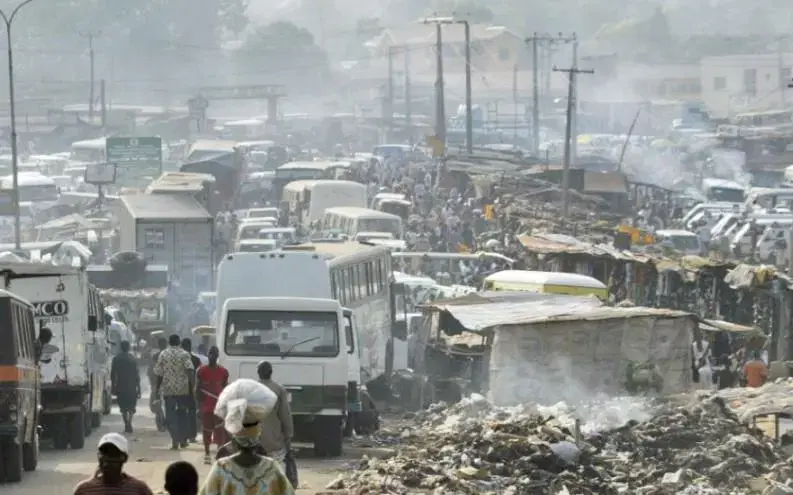As Lagos grapples with the environmental challenges stemming from rapid urbanisation, residents across the state have voiced their worries regarding the deteriorating air quality, primarily linked to indiscriminate waste burning, vehicular emissions, and poor sanitation practices.
These concerns were expressed in interviews with the News Agency of Nigeria (NAN) on Sunday in Lagos.
NAN reports that from Ikorodu to Sasha, Oshodi to Alagbado, fumes from refuse fires, exhaust pipes, and industrial discharges linger in the air, posing serious threats to public health and the environment.
Mrs Itunu Dada, a civil servant and resident of Ikorodu, informed NAN that air pollution in her community is predominantly caused by the burning of refuse.
“Instead of using the services of the PSP operators, many residents prefer to burn their waste. When you go outside, you are met with fumes of smoke from effluents. This leads to coughing and chest irritation. Around the markets, refuse dumped on the road median emits offensive odours. It’s appalling,” she said.
Dada urged the Lagos State Government to shut down markets with poor sanitation and enhance its waste evacuation efforts.
“Those responsible for waste removal from the drainage often leave it for weeks before clearing it. When it rains, the waste washes back into the drains. This is unacceptable.
“There should be a task force to monitor illegal dumping and the burning of refuse within the metropolis,” she added.
In Sasha, a suburb of the Alimosho Local Government Area, Mrs Stella Lawrence, a teacher, noted that air pollution has become a daily reality for residents.
“The large population of Lagos contributes to this issue. Many commercial vehicles are not roadworthy and emit thick fumes. The use of generators also exacerbates the problem. The government should ban unfit vehicles and ensure that the PSPs regularly remove refuse to discourage waste burning. Providing consistent electricity supply would also help reduce generator fumes,” she stated.
Similarly, Miss Chioma Ndukwe, a communications expert and resident of Okota, remarked that air pollution is particularly severe in densely populated areas like Oshodi.
“When you walk through Oshodi Market, you can hardly breathe; emissions from industries, waste burning, traffic fumes, and poor sanitation combine to create a suffocating environment,” she said.
Ndukwe urged the government to provide public toilets, conduct regular vehicle emission checks, and regulate industrial discharges.
“We must take air pollution seriously. Everyone deserves to breathe clean air in Lagos,” she insisted.
In Lekki, Mr Bruno Ajede, a businessman, acknowledged that while the area is relatively clean, pollution persists in crowded parts such as markets and Ajah.
“Car fumes are the main issue. Air pollution affects human health and can lead to respiratory problems like asthma,” Ajede explained.
Mr Ajibola Ajayi, a marketer and resident of Alagbado, added that the community suffers from significant vehicular pollution.
“Many vehicles here emit heavy smoke due to minimal regulation,” Ajayi noted.
In response to the situation, Mr Friday Oku, President of the Association of Wastepickers of Lagos, stated that Nigeria’s continued reliance on fossil fuels is exacerbating both environmental and health hazards.
“There are numerous dangers associated with fossil fuel use. It is causing serious harm to the environment and human health.
“That’s why we are advocating for renewable energy and exploring ways to mitigate air pollution in our society,” Oku said.
He criticised what he termed inconsistent government policies that undermine emission reduction efforts, citing the recent ban on waste pickers using carts, known locally as “cart pushers,” as an example.
“When we are attempting to reduce emissions from fossil fuels, the government suddenly bans cart pushers without providing any sustainable alternative.
“How can you ban them and replace them with tricycles that cause even more pollution? This reflects a lack of policy direction,” he said.
Oku added that while private and civil society groups are striving to reduce emissions through renewable energy and cleaner alternatives such as Compressed Natural Gas (CNG), government actions often contradict climate commitments.
“We oppose fossil fuel emissions from vehicles and markets. We must transition towards renewable energy and CNG. That is the only way to reduce greenhouse gas emissions,” he emphasised.
He also stressed the necessity for a change in behaviour among Nigerians.
NAN reports that health experts warn that prolonged exposure to polluted air increases the risk of respiratory infections, heart disease, and lung cancer.
However, the Lagos State Government, through the Ministry of the Environment and Water Resources, has reaffirmed its commitment to addressing air pollution via its Blue and Green Economy Initiative and Air Quality Monitoring Network.
The state has also deployed mobile sensors in strategic locations to measure pollution levels and enforce compliance among industries and transport operators.
NAN reports that residents and environmental advocates argue that until citizens cease burning waste and the government effectively enforces environmental laws, Lagos’ pursuit of clean air may remain elusive.





